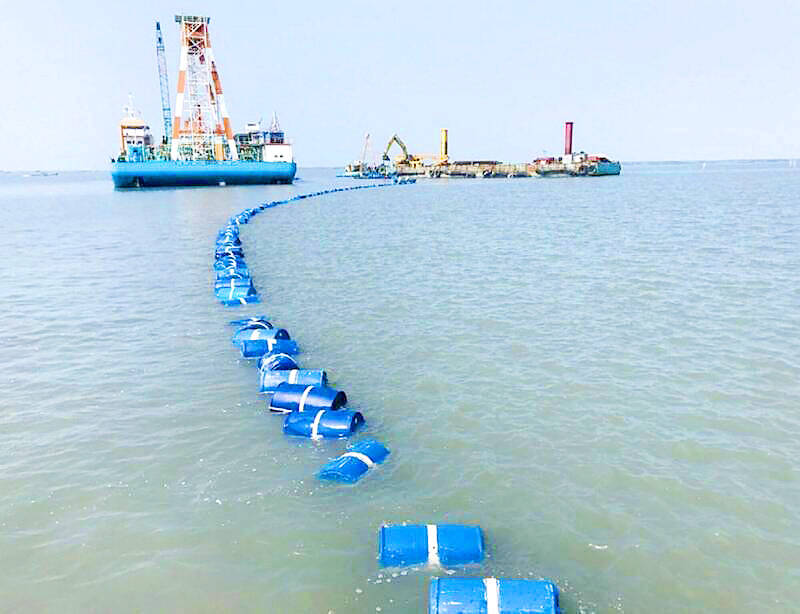The government is planning to build an Internet cable terminal in Tainan and lay two additional undersea cables to boost telecommunications resiliency, an official familiar with the matter said yesterday, speaking on condition of anonymity.
Two subsea Internet cables connecting Lienchiang County to Taiwan proper were severed in separate incidents allegedly involving a Chinese trawler and a cargo ship in early February.
The nation’s submarine cables are unevenly distributed in favor of northern Taiwan, with cable landing points in New Taipei City’s Bali (八里) and Tamsui (淡水) districts, and Yilan County’s Toucheng Township (頭城), while Taiwan’s fourth cable landing point is in Pingtung County’s Fangshan Township (枋山), the source said.

Photo courtesy of Taiwan Power Co
Southern Taiwan entirely depends on the three cables ending in Fangshan, they said.
The National Science Council has ordered the National Center for High-Performance Computing to plan a cloud server center and Internet cable landing point in Tainan, as well as a backup auxiliary node in Taichung, to bolster redundancy and security, they said.
The project is scheduled to be completed by 2025, they said, adding that private-sector entities have expressed interest.
Separately, the construction of the Southeast Asia-Japan 2 submarine cable system connecting Taiwan, Japan, South Korea and Singapore is expected to be completed by the end of this year, they said.
The system includes landing points in Tamsui and Fangshan, they said, adding that the operators decided to set up two landing points to ensure that a failure of one of them would not disconnect Taiwan from the system.
Moreover, the Apricot subsea cable, which is expected to go online late next year, has been rerouted to bypass the Philippines and Indonesia to enhance its security, they said.
Overall, 14 submarine cables link Taiwan with other countries, and the government is aware that China might try to attack them, they said.
However, several third countries also route Internet traffic through those cables, and Taipei and Beijing are aware that these countries have an interest in them remaining intact, they added.
Repairs on one of the cables connecting Lienchiang County were finished at the end of last month, restoring the outlying county’s regular Internet access, they said.
The National Communications Commission and the Cyber Security Center said Taiwan reported 51 service disruptions of subsea cables between 2018 and last year.
The disruptions include 18 that affected the Toucheng-Fanghsang dual landing points, 22 that affected the Tamsui landing point and 11 that affected the Bali landing point.
These events include 25 cases that were caused by trawler netting or ship anchors, 12 were caused by geological events, three were caused by equipment failure or wear on the cables, six were caused by scheduled maintenance and two were caused by errors made during maintenance.

CHAOS: Iranians took to the streets playing celebratory music after reports of Khamenei’s death on Saturday, while mourners also gathered in Tehran yesterday Iranian Supreme Leader Ayatollah Ali Khamenei was killed in a major attack on Iran launched by Israel and the US, throwing the future of the Islamic republic into doubt and raising the risk of regional instability. Iranian state television and the state-run IRNA news agency announced the 86-year-old’s death early yesterday. US President Donald Trump said it gave Iranians their “greatest chance” to “take back” their country. The announcements came after a joint US and Israeli aerial bombardment that targeted Iranian military and governmental sites. Trump said the “heavy and pinpoint bombing” would continue through the week or as long

TRUST: The KMT said it respected the US’ timing and considerations, and hoped it would continue to honor its commitments to helping Taiwan bolster its defenses and deterrence US President Donald Trump is delaying a multibillion-dollar arms sale to Taiwan to ensure his visit to Beijing is successful, a New York Times report said. The weapons sales package has stalled in the US Department of State, the report said, citing US officials it did not identify. The White House has told agencies not to push forward ahead of Trump’s meeting with Chinese President Xi Jinping (習近平), it said. The two last month held a phone call to discuss trade and geopolitical flashpoints ahead of the summit. Xi raised the Taiwan issue and urged the US to handle arms sales to

State-run CPC Corp, Taiwan (CPC, 台灣中油) yesterday said that it had confirmed on Saturday night with its liquefied natural gas (LNG) and crude oil suppliers that shipments are proceeding as scheduled and that domestic supplies remain unaffected. The CPC yesterday announced the gasoline and diesel prices will rise by NT$0.2 and NT$0.4 per liter, respectively, starting Monday, citing Middle East tensions and blizzards in the eastern United States. CPC also iterated it has been reducing the proportion of crude oil imports from the Middle East and diversifying its supply sources in the past few years in response to geopolitical risks, expanding

Pro-democracy media tycoon Jimmy Lai’s (黎智英) fraud conviction and prison sentence were yesterday overturned by a Hong Kong court, in a surprise legal decision that comes soon after Lai was jailed for 20 years on a separate national security charge. Judges Jeremy Poon (潘兆初), Anthea Pang (彭寶琴) and Derek Pang (彭偉昌) said in the judgement that they allowed the appeal from Lai, and another defendant in the case, to proceed, as a lower court judge had “erred.” “The Court of Appeal gave them leave to appeal against their conviction, allowed their appeals, quashed the convictions and set aside the sentences,” the judges